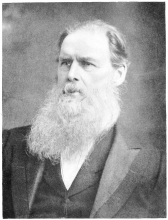Edward Burnett Tylor was born 2 October 1832 to Harriet Skipper and Joseph Tylor, the owner of a brass foundry in their home town of Camberwell in Surrey. Both parents belonged to the Society of Friends and elected to have their son educated at Grove House, a Quaker school in Tottenham. When they reached the age of sixteen, both Edward and his brother, the geologist Alfred Tylor, were denied entrance to a university on account of their faith. Instead, Edward became a clerk in his family’s business, a job he kept for seven years. His eventual career was, of course, to be quite different.
In 1855, Tylor developed symptoms in indicative of an onset of tuberculosis. To allow his lungs to recover, Tylor left work and travelled to the United States. In Cuba in 1856 he met the ethnologist Henry Christy, with whom he journeyed to Mexico. It was Christy’s influence, perhaps, which led Tylor to write his first book, Anahuac, or, Mexico and the Mexicans, Ancient and Modern (1861), based on his observations from this expedition. Tylor’s career from then followed this pattern, combining extensive travel with pioneering anthropological research. He later came to be regarded as the ‘father of anthropology’, being the first to hold the chair in the subject at Oxford (1896). Prior to this, Oxford had appointed him as reader in anthropology (1884), and had awarded him the degree of Doctor of Civil Law (1875). He eventually retired as emeritus professor in 1909.
Tylor is chiefly known for two works: Primitive Culture: Researches into the Development of Mythology, Philosophy, Religion, Art and Custom (1871) and Anthropology: An Introduction to the Study of Man and Civilization (1881). The former offered the first anthropological definition of culture, which was crucial in the development of the idea of anthropology as a science. It is also known for its analysis of primitive cultures, the development of theories regarding primitive animistic beliefs, and his notion of survivals, which he used to show how cultural practices of the present are often owed to long-discarded, primitive superstitions. Organised traditional religion, which Tylor had abandoned in his own life, was one such cultural practice he attacked from this perspective.
Tylor’s Anthropology became the classic textbook for the subject, providing an extensive introduction to the developing field of study. This and other of his works were highly influential and have in many respects aged well. Many of his writings are still considered relatively modern and relevant to the subject today. He was, of course, a teacher as well as a writer, and he established the structure of an anthropology degree at Oxford. Other universities quickly followed. As further testament to his achievement, he was also made president of the Anthropological Society in 1891.
Tylor’s Gifford Lectures were the first to be given at Aberdeen. He delivered two sets of ten lectures between 1889 and 1891. These ought to have been published in a book entitled The Natural History of Religion. Unfortunately, his failing mental capacities in later life prevented his completion of the project.
Tylor was knighted in 1912. For his remaining years he lived in Wellington, Somerset. Though he was physically well, he suffered from mental deterioration. He died at 84 on 2 January 1917 after a short illness, and was survived by his wife, Anna. They had been together since 1858 but had never had children.
Tylor’s works include Anahuac, or, Mexico and the Mexicans, Ancient and Modern (1861),Researches into the Early History of Mankind and the Development of Civilization (1865), ‘The Religion of Savages’ in The Fortnightly Review (1866), ‘The Survival of Savage Thought in Modern Civilization’ in Proceedings of the Royal Institute (1869), Primitive Culture: Researches into the Development of Mythology, Philosophy, Religion, Art and Custom(1871), ‘On a Method of Investigating the Development of Marriage’ in Journal of the Anthropological Institute (1889) and Anthropology: An Introduction to the Study of Man and Civilization (1881).



